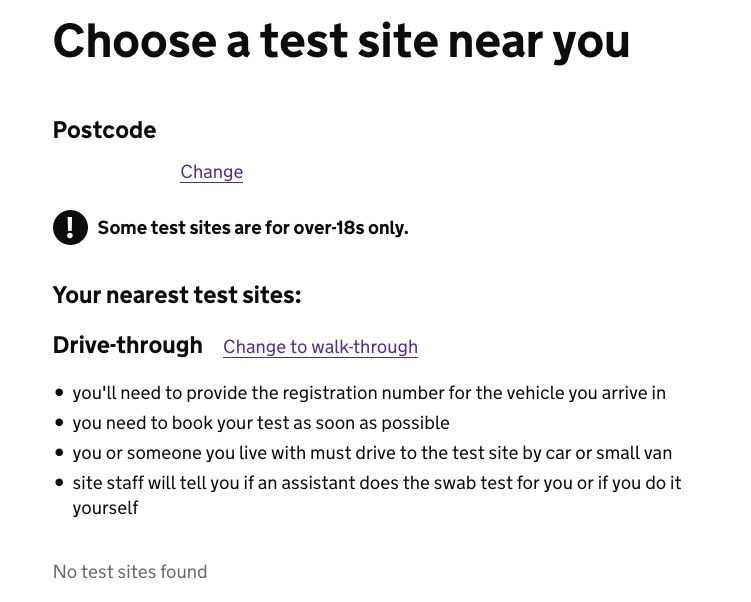Here, then, is a story from Covid Britain. It will be a longish thread.
It starts with this story I wrote for The Guardian on the UK's readiness for the autumn/winter:
theguardian.com/commentisfree/…
It starts with this story I wrote for The Guardian on the UK's readiness for the autumn/winter:
theguardian.com/commentisfree/…
My instinct screams that the answer to the title question is: "probably not much". But I'm determined to avoid kneejerk cynicism, and to listen to what I'm told by folks who know. And the answers are mixed, but one thing gives me a little bit of hope...
...which is that it sounds like the testing situation, while still having a way to go before being good, is at least not too bad. We have quite a lot of capacity, at that stage apparently exceeding the demand. So that's somewhat encouraging.
But even as schools and workers are returning, stories start coming in of people unable to get tests, or being asked to travel hundreds of miles to get one. Households are left in limbo, unable to get tested & not knowing what to do.
Then we hear about Operation Moonshot, the UK government's grand plan to establish a £100 bn mass testing regime perhaps handling up to 10m tests a day by early 2021, using technology still in development. And the general reaction from most experts is: you must be joking.
Much of today I have been completing an article on this for Prospect, to go live tomorrow morning. I haven't minced words (most of the critical ones being other people's who know more than I do). But I have again also wanted to be fair and to hear a range of views.
And again, it is possible to find a few reasons not to be simply reflexively cynical, at least about the principle. One wants, as a writer, at least to do better than say "This shower in charge have yet to demonstrate competence at anything" - even if there's some truth in that.
While I'm writing, I'm interrupted from time to time by a bored youngest daughter, at home from school because she clearly seems to have the cold that's already being going round her class. We are monitoring her state nervously. So far, all classic cold symptoms, not Covid...
But at one point in the early afternoon, she clearly has a bit of a temperature. 37 degrees... 37.5, thereabouts. Then at one point it hits 38 before going down to normal. So what now?
We agonize. The eldest has just been settling into her new year at secondary, and of course will have to stay home if we decide to give the youngest a test. But really, we realize it is the responsible thing to do - even though by now, this evening, she's right as rain.
I see now too how crap the system is even if it was working. There seems to be no option right away to book a test for a child only. Do do we enter her name at the outset? Ours? Anyway, it's a moot point. There are no tests available.
We're very lucky. Having to stay at home is not a problem either for me or my partner. If someone in this position were faced with lost earnings, the need to cancel appointments, to keep large numbers of kids all at home again, and all because you're obeying...
... the letter of the "rules" because of a single temperature reading (no other "suspect" symptoms), I think you could be forgiven for saying, Sod it, she's fine.
Will we be able to get a test? I've no idea.
Will we be able to get a test? I've no idea.
Should we be generous about the government's ability to deliver Operation Moonshot?
I leave you to decide.
But if anyone feels my article for Prospect tomorrow is unduly harsh, please don't bother telling me so.
I leave you to decide.
But if anyone feels my article for Prospect tomorrow is unduly harsh, please don't bother telling me so.
And here's the final thing. The folks working to develop tests and ramp up capacity have been working their butts off, all in good faith. I completely respect them, and this situation traduces their efforts.
No, they are not the problem.
No, they are not the problem.
Ah.
Totally right that, amidst this shambles, priority goes to hospital & care workers and those in worst-hit areas. I suspect this means there is effectively very little testing going to happen outside of that.
theguardian.com/world/2020/sep…
Totally right that, amidst this shambles, priority goes to hospital & care workers and those in worst-hit areas. I suspect this means there is effectively very little testing going to happen outside of that.
theguardian.com/world/2020/sep…
Yes, I'm very angry. Not for my family - we're not at risk, I'm quite sure of that. But for those who are.
And because those who should have seen this coming apparently did not.
(I don't mean Hancock. I expect nothing useful from him.)
And because those who should have seen this coming apparently did not.
(I don't mean Hancock. I expect nothing useful from him.)
• • •
Missing some Tweet in this thread? You can try to
force a refresh








